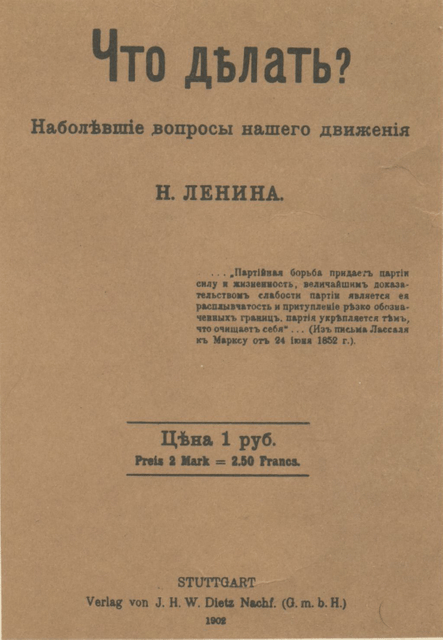What Is to Be Done?

What Is to Be Done?

What Is to Be Done? Burning Questions of Our Movement (Russian: Что делать? Наболевшие вопросы нашего движения, tr. Chto delat'? Nabolevshiye voprosy nashevo dvizheniya) is a political pamphlet written by the Russian revolutionary Vladimir Lenin (credited as N. Lenin) in 1901 and published in 1902.[1] Lenin said that the article represented "a skeleton plan to be developed in greater detail in a pamphlet now in preparation for print".[2] Its title is inspired by the novel of the same name by the 19th century Russian revolutionary Nikolai Chernyshevsky.
In What Is to Be Done?, Lenin argues that the working class will not spontaneously become political simply by fighting economic battles with employers over wages, working hours and the like. To educate the working class to Marxism, Lenin insists that Marxists should form a political party, or vanguard, of dedicated revolutionaries to spread Marxist political ideas among the workers. The pamphlet precipitated in part the split of the Russian Social Democratic Labor Party between Lenin's Bolsheviks and the Mensheviks.[3]
Main points
Lenin first confronted the so-called economist trend in Russian social democracy which followed the line of Eduard Bernstein. He explained that Bernstein's positions were opportunist, a point expressed by the French socialist Alexandre Millerand as in taking a post in a bourgeois government. Against the economists' demand for freedom of criticism, Lenin advanced the position that the orthodox Marxists had the same right to criticize in return. He stressed that in the struggle against the bourgeoisie revolutionary social democrats would need to pay particular attention to theoretical questions, recalling Engels' position that there were three forms of social democratic struggle, namely political, economic and theoretical.[4]
Lenin puts the case that workers will not spontaneously become Marxists just by fighting battles over wages with their employers; instead, Marxists need to form a political party to publicise Marxist ideas and persuade workers to become Marxists. He goes on to argue that to understand politics you must understand all of society, not just workers and their economic struggles with their employers. To become political and to become Marxists, workers need to learn about all of society, not just their own corner of it, arguing:
Class political consciousness can be brought to the workers only from without; that is, only from outside the economic struggle, from outside the sphere of relations between workers and employers. The sphere from which alone it is possible to obtain this knowledge is the sphere of relationships (of all classes and strata) to the state and the government, the sphere of the interrelations between all classes.[5]
Writing about the wave of strikes in late 19th century Russia, Lenin states that "the history of all countries shows that the working class, exclusively by its own efforts, is able to develop only trade-union consciousness"; that is, combining into trade unions and so on. However, socialist theory in Russia, as elsewhere in Europe, was the product of the "educated representatives of the propertied classes", the intellectuals or "revolutionary socialist intellectuals". Lenin states that Karl Marx and Friedrich Engels themselves, the very founders of modern scientific socialism, belonged to this bourgeois intelligentsia.[6]
See also
Vladimir Lenin bibliography